Abstract
This paper describes features and purposes for opening the learner model to the learner. Building on previous studies of use of a range of open learner models, it considers the features that are preferred by university level, experienced open learner model users. Recommendations are presented to help guide open learner model designers in their choices of features to make available to learners, with reference to user control, privacy, navigation, visualisation content and detail, comparisons and releasing models to peers.
Access this chapter
Tax calculation will be finalised at checkout
Purchases are for personal use only
Preview
Unable to display preview. Download preview PDF.
Similar content being viewed by others
References
Bull, S., Kay, J.: Student Models that Invite the Learner. The SMILI Open Learner Modelling Framework. Int. J. of Artificial Intelligence in Education 17(2), 89–120 (2007)
Bull, S., Mabbott, A., Gardner, P.H., Jackson, T., Lancaster, M.J., Quigley, S., Childs, P.A.: Supporting Interaction Preferences and Recognition of Misconceptions with Independent Open Learner Models. In: Nejdl, W., Kay, J., Pu, P., Herder, E. (eds.) AH 2008. LNCS, vol. 5149, pp. 62–72. Springer, Heidelberg (2008)
Mazzola, L., Mazza, R.: GVIS: A Facility for Adaptively Mashing Up and Representing Open Learner Models. In: Wolpers, M., Kirschner, P.A., Scheffel, M., Lindstaedt, S., Dimitrova, V. (eds.) EC-TEL 2010. LNCS, vol. 6383, pp. 554–559. Springer, Heidelberg (2010)
Reimann, P., Bull, S., Halb, W., Johnson, M.: Design of a Computer-Assisted Assessment System for Classroom Formative Assessment. In: CAF 2011. IEEE (2011)
Bull, S., Jackson, T., Lancaster, M.: Students’ Interest in their Misconceptions in First Year Electrical Circuits and Mathematics Courses. International Journal of Electrical Engineering Education 47(3), 307–318 (2010)
Kay, J.: Learner Know Thyself: Student Models to Give Learner Control and Responsibility. In: Halim, Z., Ottomann, T., Razak, Z. (eds.) ICCE, AACE, pp. 17–24 (1997)
Dimitrova, V.: StyLE-OLM: Interactive Open Learner Modelling. Int. J. of Artificial Intelligence in Education 13(1), 35–78 (2003)
Mabbott, A., Bull, S.: Student Preferences for Editing, Persuading, and Negotiating the Open Learner Model. In: Ikeda, M., Ashley, K., Chan, T.-W. (eds.) ITS 2006. LNCS, vol. 4053, pp. 481–490. Springer, Heidelberg (2006)
Perez-Marin, D., Pascual-Nieto, I.: Showing Automatically Generated Students’ Conceptual Models to Students and Teachers. Int. J. of Artificial Intelligence in Education 20(1), 47–72 (2010)
Mitrovic, A., Martin, B.: Evaluating the Effect of Open Student Models on Self-Assessment. Int. J. of Artificial Intelligence in Education 17(2), 121–144 (2007)
Zapata-Rivera, J.D., Greer, J.E.: Interacting with Inspectable Bayesian Models. Int. J. of Artificial Intelligence in Education 14, 127–163 (2004)
Bull, S., Gakhal, I., Grundy, D., Johnson, M., Mabbott, A., Xu, J.: Preferences in Multiple-View Open Learner Models. In: Wolpers, M., Kirschner, P.A., Scheffel, M., Lindstaedt, S., Dimitrova, V. (eds.) EC-TEL 2010. LNCS, vol. 6383, pp. 476–481. Springer, Heidelberg (2010)
Ahmad, N., Bull, S.: Learner Trust in Learner Model Externalisations. In: Artificial Intelligence in Education 2009. IOS Press, Amsterdam (2009)
Bull, S., Britland, M.: Group Interaction Prompted by a Simple Assessed Open Learner Model that can be Optionally Released to Peers. In: Brusilovsky, P., Papanikolaou, K., Grigoriadou, M. (eds.) Proceedings of Workshop on Personalisation in E-Learning Environments at Individual and Group Level (PING), User Modeling (2007)
Bull, S., Mabbott, A., Abu-Issa, A.: UMPTEEN: Named and Anonymous Learner Model Access for Instructors and Peers. Int. J. of AI in Education 17(3), 227–253 (2007)
Kerly, A., Ellis, R., Bull, S.: CALMsystem: A Conversational Agent for Learner Modelling. Knowledge-Based Systems 21(3), 238–246 (2008)
Demmans Epp, C., McCalla, G.: ProTutor: Historic Open Learner Models for Pronunciation Tutoring. In: Biswas, G., Bull, S., Kay, J., Mitrovic, A. (eds.) AIED 2011. LNCS, vol. 6738, pp. 441–443. Springer, Heidelberg (2011)
Hsiao, I.-H., Bakalov, F., Brusilovsky, P., König-Ries, B.: Open Social Student Modeling: Visualizing Student Models with Parallel IntrospectiveViews. In: Konstan, J.A., Conejo, R., Marzo, J.L., Oliver, N. (eds.) UMAP 2011. LNCS, vol. 6787, pp. 171–182. Springer, Heidelberg (2011)
Kay, J., Yacef, K., Reimann, P.: Visualisations for Team Learning: Small Teams Working on Long-Term Projects. In: Chinn, C., Erkens, G., Puntambekar, S. (eds.) Minds, Mind, and Society CSCL, pp. 351–353. International Society of the Learning Sciences (2007)
Bakalov, F., König-Ries, B., Nauerz, A., Welsch, M.: IntrospectiveViews: An Interface for Scrutinizing Semantic User Models. In: De Bra, P., Kobsa, A., Chin, D. (eds.) UMAP 2010. LNCS, vol. 6075, pp. 219–230. Springer, Heidelberg (2010)
Bull, S.: Features of an Independent Open Learner Model Influencing Uptake by University Students. In: De Bra, P., Kobsa, A., Chin, D. (eds.) UMAP 2010. LNCS, vol. 6075, pp. 393–398. Springer, Heidelberg (2010)
Johnson, M., Bull, S.: Belief Exploration in a Multiple-Media Open Learner Model for Basic Harmony. In: Dimitrova, V., Mizoguchi, R., du Boulay, B., Graesser, A. (eds.) Artificial Intelligence in Education 2009, pp. 299–306. IOS Press, Amsterdam (2009)
Johan, R., Bull, S.: Promoting Collaboration and Discussion of Misconceptions Using Open Learner Models. In: Bader-Natal, A., Walker, E., Rose, C.P. (eds), Proceedings of Workshop on Opportunities for Intelligent and Adaptive Behavior in Collaborative Learning Systems, Intelligent Tutoring Systems, 9-12 (2010)
Bull, S., Kay, J.: Open Learner Models as Drivers for Metacognitive Processes. In: Azevedo, R., Aleven, V. (eds), Int. Handbook Metacognition & Learning Technologies (in pr.)
Author information
Authors and Affiliations
Editor information
Editors and Affiliations
Rights and permissions
Copyright information
© 2012 Springer-Verlag Berlin Heidelberg
About this paper
Cite this paper
Bull, S. (2012). Preferred Features of Open Learner Models for University Students. In: Cerri, S.A., Clancey, W.J., Papadourakis, G., Panourgia, K. (eds) Intelligent Tutoring Systems. ITS 2012. Lecture Notes in Computer Science, vol 7315. Springer, Berlin, Heidelberg. https://doi.org/10.1007/978-3-642-30950-2_53
Download citation
DOI: https://doi.org/10.1007/978-3-642-30950-2_53
Publisher Name: Springer, Berlin, Heidelberg
Print ISBN: 978-3-642-30949-6
Online ISBN: 978-3-642-30950-2
eBook Packages: Computer ScienceComputer Science (R0)




